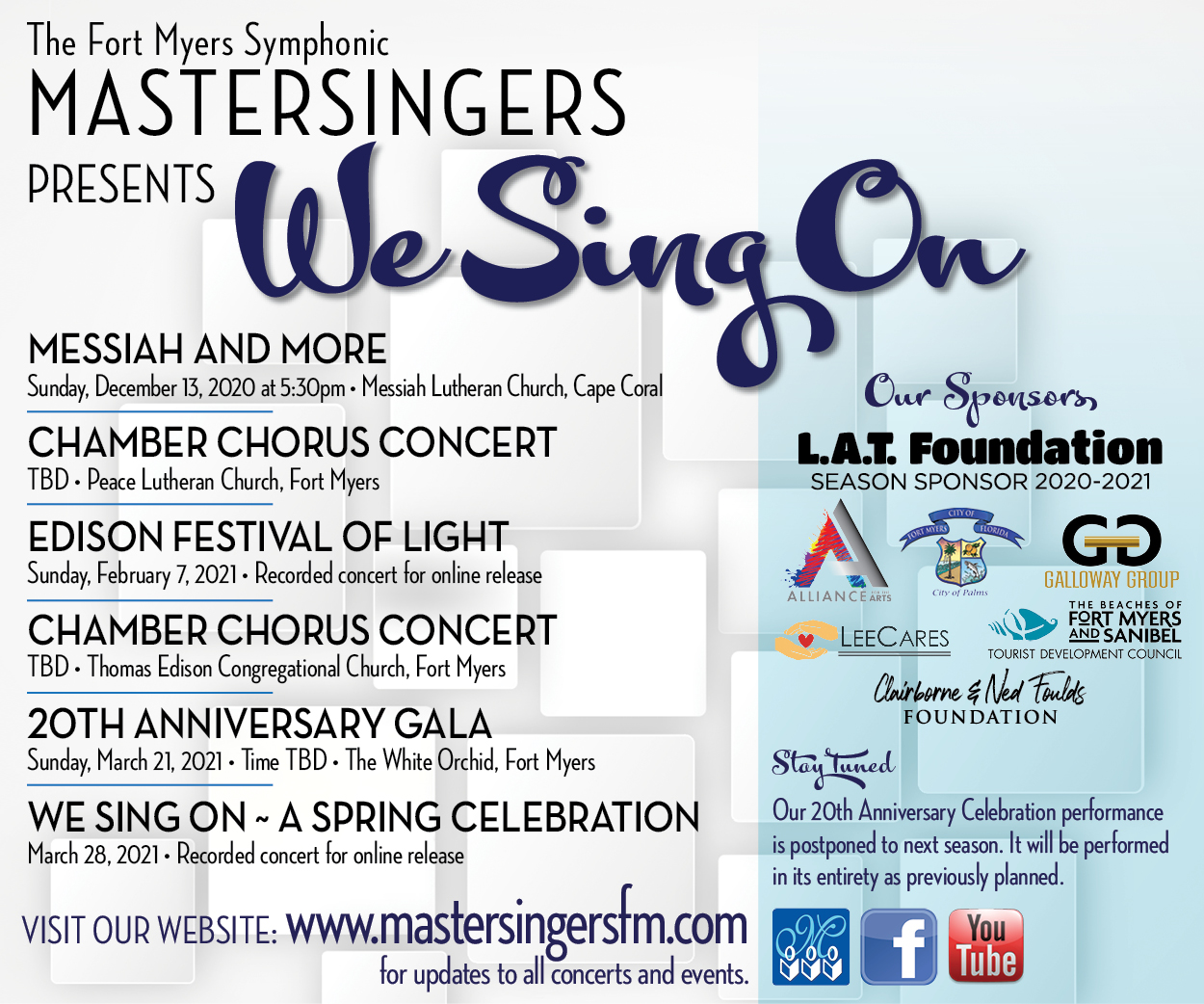Gulf Coast Chamber Orchestra Presents
Shostakovich, Walker, & Schoenberg
February 12
Music & Arts Community Center

2020-2021 Season Sponsor: Gunterberg Charitable Foundation – Culliton Family
Conductor
Dr. Andrew M. Kurtz
Program
Chamber Symphony, Op. 110a
From String Quartet No. 8, Op. 110
SHOSTAKOVICH
Lyric for Strings
WALKER
Transfigured Night, Op. 4
SCHOENBERG
Composer Spotlight
George Walker
George Theophilus Walker (June 27, 1922 – August 23, 2018) was an American composer, pianist, and organist, who was the first African American to have won the Pulitzer Prize for Music. He received the Pulitzer, in 1966, for his work Lilacs.
Walker was born in Washington, D.C., on June 27, 1922. His father emigrated to the United States from Kingston, Jamaica and became a physician. Walker started taking piano at the age of five, and his lessons were supervised by his mother. He attended Dunbar High School, in Washington D.C. and was also a student at Howard University, which hosted his first public recital at the age of 14. At the age of 18 he began composing. He did this, he said, to keep himself “musically engaged,” after spending 5 hours a day practicing the piano.
He was admitted to the Oberlin Conservatory where he studied piano with David Moyer and organ with Arthur Poister. In 1939, he became the organist for the Graduate School of Theology of Oberlin College. Graduating at 18 from Oberlin College with the highest honors in his Conservatory class, he was admitted to the Curtis Institute of Music to study piano with Rudolf Serkin, chamber music with William Primrose and Gregor Piatigorsky, and composition with Rosario Scalero, teacher of Samuel Barber. Walker graduated from the Curtis Institute in1945, receiving Artist Diplomas in both piano and composition becoming one of the first black graduates of the music school.
In 1945, at the age of 23, he made his New York debut in Manhattan’s Town Hall, the first black person to perform there; and two weeks later he performed Rachmaninoff’s 3rd Piano Concerto with the Philadelphia Orchestra, conducted by Eugene Ormandy, as the winner of the Philadelphia Youth Auditions. He was the first black instrumentalist to appear with this orchestra.
Walker was awarded both a Fulbright Fellowship and a John Hay Whitney Fellowship in 1957. He spent the next two years in Paris studying composition with Nadia Boulanger. In 1959, he embarked upon another international tour, playing concerts in France, Holland and Italy. In 1963, after a recital in London, he received an honorary membership in the Frederic Chopin Society.
In 1946, Walker composed his String Quartet no.1, originally titled “Lament.” The piece is dedicated to his grandmother, who died a year earlier. Walker later changed the title to Lyric for Strings. Lyric was originally the middle movement of a string quartet that proved so popular that the composer repurposed into a larger orchestral work. It was one of the most frequently performed orchestral works by a living American composer.
Lyric is driven by separate linear melody and accompaniment lines in the strings that occasionally come together for climactic moments of harmony. The rich and flowing melodic line is passed through the instruments to create a powerful emotional pull, such that the “lament” intended in the piece makes itself known to the listener.
As a composer, Walker’s music has been influenced by a wide variety of musical styles due to his exposure to the music of Chopin, Brahms, Beethoven, jazz, folk songs, and church hymns. Unwilling to conform to a specific style, Walker drew from his diverse knowledge of previous music to create something which he could call his own. A prodigious musician, his subsequent body of work included over 90 works for orchestra, chamber orchestra, piano, strings, voice, organ, clarinet, guitar, brass, woodwinds, and chorus.
Walker was married to pianist and scholar Helen Walker-Hill, who pre-deceased him; and the couple had two sons, violinist and composer Gregory T.S. Walker, and playwright Ian Walker.
Andrew M. Kurtz
Music & Executive Director
Gulf Coast Symphony founder Dr. Andrew M. Kurtz enters his twenty-sixth season as the Symphony’s Music & Executive Director, and conductor. His deep rooted commitment to new work, community and education, combined with a vibrant artistic vision has led to creating and nurturing one of the most dynamic arts organizations in the region. His conducting has been called “passionate, expansive, expert, and musical.” He was named the 2007 Performing Artist of the Year at Lee County’s Angel of the Arts Awards. Kurtz’s repertoire encompasses a wide range of music styles from baroque to contemporary, and multiple genres including symphonic, opera, ballet, musical theater, jazz, cantorial, and symphonic pops.
An avid arts educator, Maestro Kurtz was Resident Music Director at the Luzerne Music Center. Kurtz is a past-president of the board of the Lee County Alliance for the Arts. In 2001, he won First Prize in the Dell’Arte di Firenze International Conducting Competition, and made his European conducting debut in Florence. In 1995, Kurtz made his international operatic debut in Tel Aviv while working as a staff conductor at the Israel Vocal Arts Institute. In 1997, he conducted the Metropolitan Opera Guild’s educational tour production of The Best of Puccini. He was a scholarship conducting student at the prestigious Aspen Music Festival, and boasts numerous other conducting credits, including the Pennsylvania Opera Theater, the Pennsylvania Ballet, the Charlotte Symphony, Gonzaga Symphony, and the Ocean City Pops.
Kurtz completed his doctoral studies in conducting at the Peabody Conservatory and is a Phi Beta Kappa graduate of the University of Virginia where he received his master’s degree in music history and a bachelor of arts in music and drama. A native of Philadelphia, Kurtz has called Southwest Florida home for more than 28 years, where he currently resides with his wife, Julie, and their son, Benjamin.
Gulf Coast Chamber Orchestra
Violin 1
Sean O’Neil
Charles Hardt
Marcia Prezioso
Ariel Eliot
Katrina Rozmus
Violin 2
Galen Kaup
Rachel Cox
Clive Owens
Margaret Nichols
John DiPuccio
Ellen Fox
Viola
Alfonso Giordano
Ron Erickson
Courtney Filner
Greg Lane
Cello
Antonio Innaimo
Scott Crowley
Timothy Torres
Double Bass
Scott Davis
Doni Landefeld
Upcoming Concerts
Celebrate love with singing and dancing duo Kirby & Beverly Ward
2/14
Featuring the Gulf Coast Jazz Collective
2/20
Four talented students of the Frost School of Music
2/28






